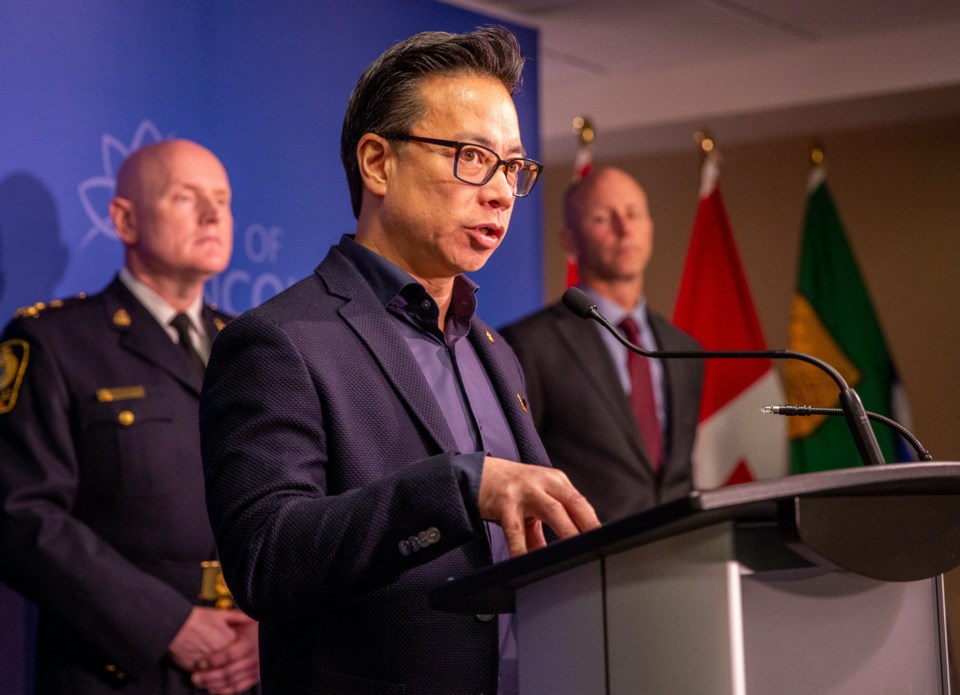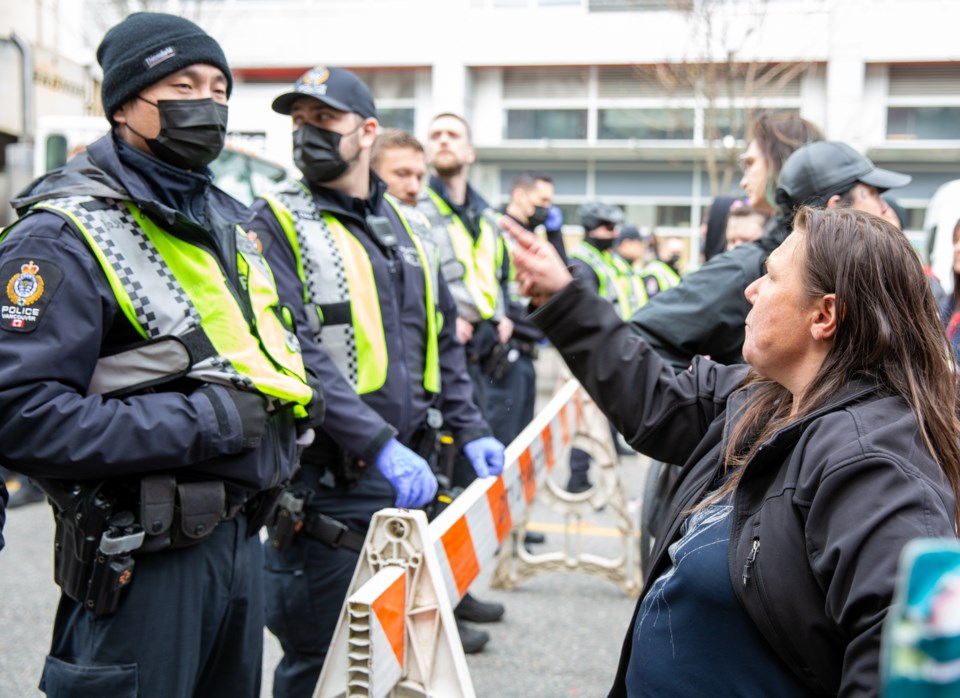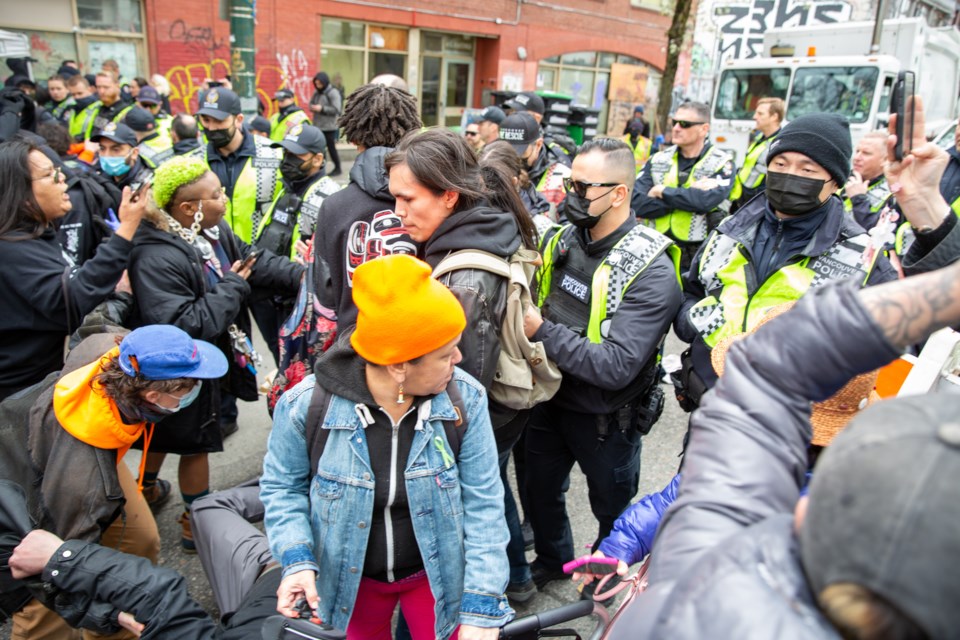B.C.’s police complaint commissioner says it appears the Vancouver Police Department created an “exclusion zone” to keep the public and media away from stepped-up enforcement action taken in April to clear East Hastings of tents and structures.
Clayton Pecknold came to that conclusion after reading concerns raised by a complainant and public statements made by the VPD regarding the mobilization April 5 of dozens of officers and city crews in the Downtown Eastside.
“After review of the concerns raised in the complaint and the public statements of the VPD, it appears that an ‘exclusion zone’ was created by the VPD for the purpose of excluding the public and the media from a specific section of the city for a defined period of time,” Pecknold wrote in a letter to Faye Wightman, the vice-chair of the Vancouver Police Board.
“It is unclear what lawful authority was relied upon in the creation and enforcement of this ‘exclusion zone.’”
Pecknold noted the matter of the legality of “exclusion zones” has been the subject of consideration by the courts, most notably in the context of civil disobedience. He didn’t elaborate on cases or rulings.
The commissioner wrote the letter to Wightman April 14, but it didn’t go public until this week as part of a police board meeting agenda. The complainant’s name is redacted from Pecknold’s letter.
A second complaint regarding the city-led operation April 5 is also included in the agenda. The complainant, whose name is also redacted, alleges “gross overreach of power by the VPD” in the action taken in April.
Both complaints will go before the board Thursday at a public meeting. The board must do one or more of the following:
• Request that Chief Adam Palmer investigate and report on the complaints.
• Initiate a study concerning the complaints.
• Initiate an investigation into the complaints.
• Dismiss the complaints with reasons.
• Take any other course of action the board considers necessary to respond adequately to the complaints.

'Pool camera'
In addition, Pecknold recommended the board obtain independent advice “distinct from the VPD” in addressing the “exclusion zone” complaint. He noted Palmer and Mayor Ken Sim, who doubles as chairperson of the board, were “directly involved in the circumstances which give rise to this complaint.”
Pecknold did not elaborate on how long the “defined period of time” of the exclusion zone lasted or which part of the Downtown Eastside was off-limits to the public and media.
But Palmer did say at an April 5 morning news conference that only one “pool camera” was allowed “down there;” he didn’t define which area.
“There's lots of people down there with smartphones taking video and all kinds of coverage right now with mainstream media and also social media,” the chief said at the time.
“It's just not opened up as a free-for-all where 50 people can come in with television cameras. But there's a pool camera set up there and you can monitor what's going on.”
Fire chief's order
Coincidentally, that same morning, a city traffic camera at Main and Hastings that can be viewed online by the public inexplicably stopped working.
City manager Paul Mochrie said at the same morning news conference that “we do want to acknowledge that there was an inadvertent technical error on the part of our staff where the traffic camera at Main and Hastings was disabled for roughly half an hour at approximately 9:15. That was a mistake.”
Glacier Media’s experience a few hours after the action began April 5 was media was able to roam freely on East Hastings. Police, however, did create moving walls of officers at certain points to allow city crews to remove tents without interruption.
The action taken April 5 was part of an ongoing push by the city that was initiated in July 2022 by Fire Chief Karen Fry, who issued an order to clear the sidewalks, citing concerns over public safety.
Although the encampment was cleared for the most part in April, police and city crews continue to take action against people who set up tents and structures along the strip.

'Higher than budgeted overtime'
As a result, the VPD has incurred “higher than budgeted overtime costs as result of the Hastings deployment,” according to a separate report that also goes before the police board Thursday.
Reporters heard from Mochrie at the April 5 news conference that since August 2022, more than 90 people from the strip had moved into permanent housing, and another 160 accepted referrals to shelters.
As part of the operation April 5 and 6, crews took down 94 “entrenched structures” and removed 50 propane tanks from the encampment zone. More than 70 totes for storage were also provided to individuals and stored off-site, the city said one week after the stepped-up enforcement.
In addition, the city said its teams engaged with 56 people associated with structures removed over April 5 and 6. Of those, 18 accepted referrals to shelters, whose operators held beds for each of them.






